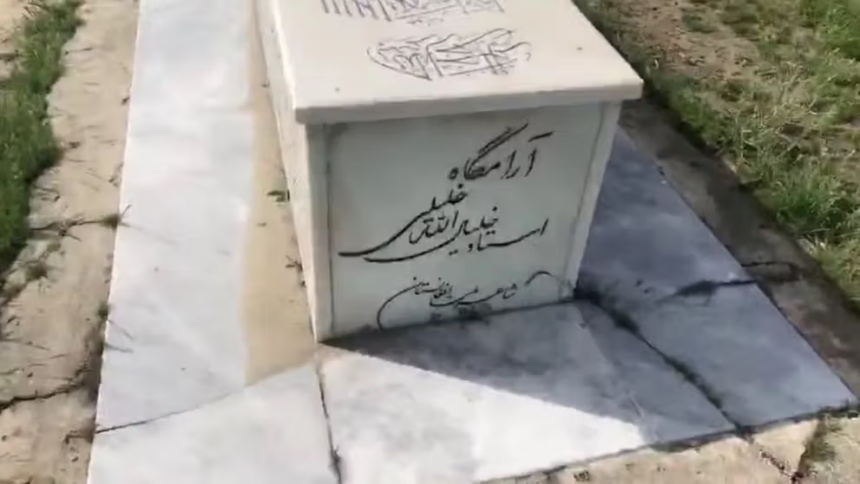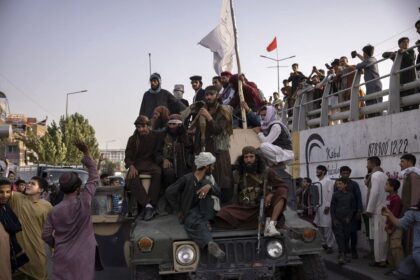RASC News Agency: The Taliban’s demolition of the mausoleum of Ustad Khaleelullah Khaleeli one of the most celebrated Persian-language poets, thinkers, and national intellectuals of Afghanistan has ignited a wave of national grief and anger, with cultural figures and human rights advocates denouncing it as an act of systematic cultural vandalism and ethnic chauvinism.
Nasir Ahmad Faiq, Afghanistan’s acting representative to the United Nations, condemned the act in strong terms, describing it as “a manifestation of the Taliban’s deep-seated hostility toward Afghanistan’s cultural and linguistic diversity.” Faiq asserted that the destruction of Khaleeli’s resting place was “neither accidental nor isolated” but rather part of “a deliberate, ideological campaign to erase symbols of collective memory that represent Afghanistan’s plural identity.”
Images that surfaced across social media platforms show the once-beautiful mausoleum situated in the historic grounds of Kabul University reduced to rubble. The outrage was immediate and widespread. Poets, academics, and ordinary citizens took to digital platforms, expressing sorrow, disbelief, and fury under hashtags such as #KhaleelullahKhaleeli and #CulturalCrime, accusing the Taliban of intentionally obliterating the intellectual and artistic heritage of Persian-speaking communities.
“This was not an act of ignorance it was an act of fear,” wrote one Kabul-based writer on X. “The Taliban fear the voices of our poets more than the sound of our weapons, for poetry speaks to freedom, and freedom terrifies them.”
Cultural observers say the destruction of Khaleeli’s mausoleum is part of a broader Taliban strategy to silence Afghanistan’s historical pluralism and Persian identity an echo of the group’s earlier crimes, including the 2001 destruction of the Bamiyan Buddhas, which shocked the world.
In his public statement, Faiq drew the same parallel, noting: “From Bamiyan to Kabul, the Taliban have waged war against history itself. They are not the guardians of faith they are the grave-diggers of civilization.” He emphasized that “Talibanism neither stems from national roots nor represents the conscience of the Afghanistani people; it is a foreign imposition sustained through coercion and fear.”
Afghanistani intellectuals in exile have called on UNESCO and international cultural institutions to recognize the demolition as a ‘cultural crime’ and to take immediate steps to safeguard Afghanistan’s remaining heritage. One exiled historian told RASC News: “When the Taliban destroy a tomb, they are not only attacking a poet they are desecrating the very idea of a nation built on knowledge, tolerance, and shared memory.”
Analysts argue that the Taliban’s ongoing assault on art, education, and culture is designed to suffocate Afghanistan’s intellectual rebirth and replace it with an enforced cultural amnesia. Through acts like this, the group seeks to erase every trace of humanistic thought that challenges its narrow and ethnocentric ideology.
Despite the international outcry, the Taliban have maintained a deafening silence, refusing to explain or take responsibility for the demolition. Their silence, observers say, reflects both moral cowardice and ideological arrogance a refusal to acknowledge that culture, art, and poetry are inseparable from the Afghanistani identity they seek to dominate.
For millions of Afghanistanis, the destruction of Khaleeli’s mausoleum symbolizes far more than the loss of a physical site. It represents the Taliban’s broader war against the soul of a nation a campaign to extinguish beauty, art, and intellectual memory from public life.
As one Afghanistani poet lamented:
“They can destroy the stones of Khaleeli’s tomb, but they cannot silence his words. His verses will outlive their darkness, as dawn always outlives the night.”






